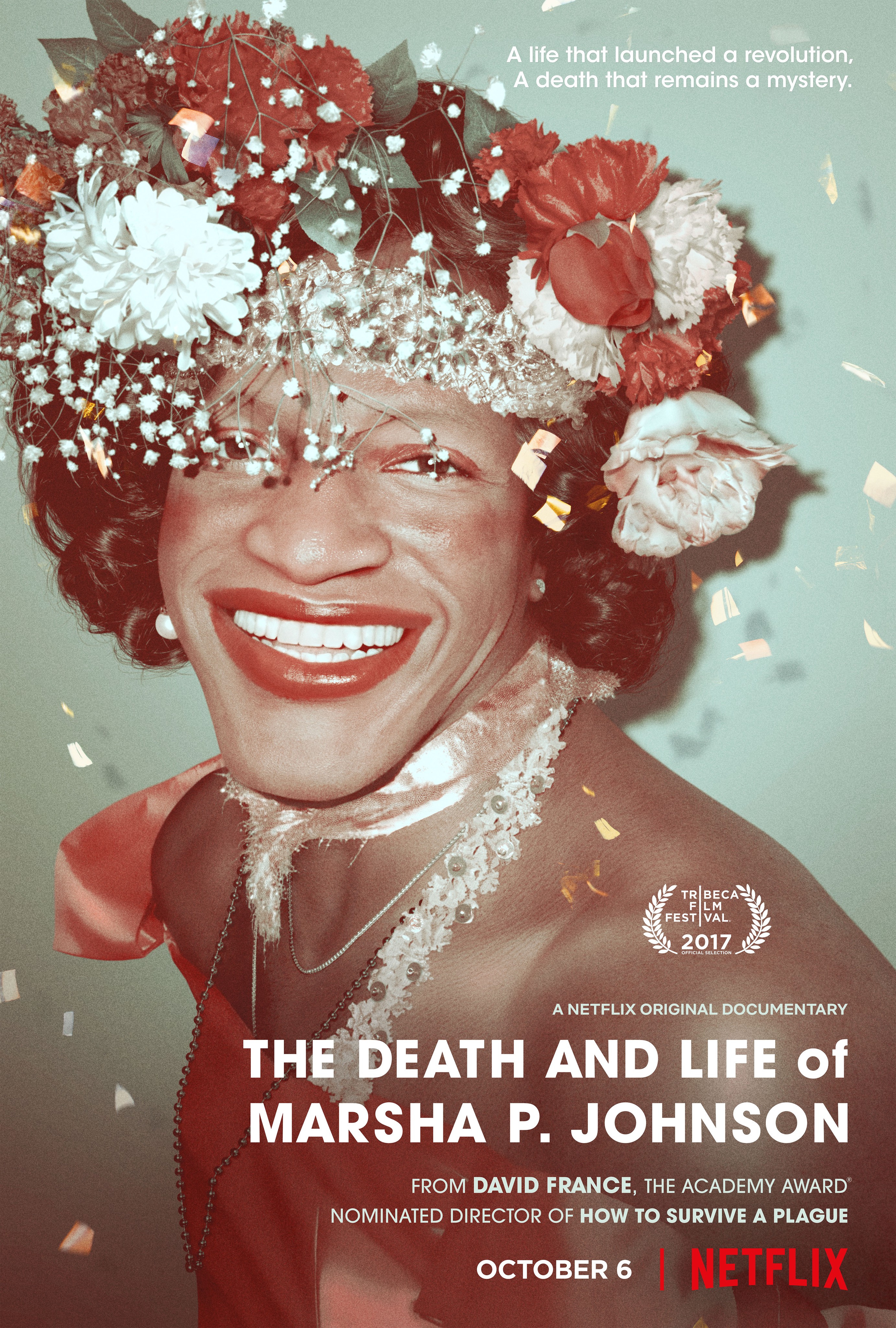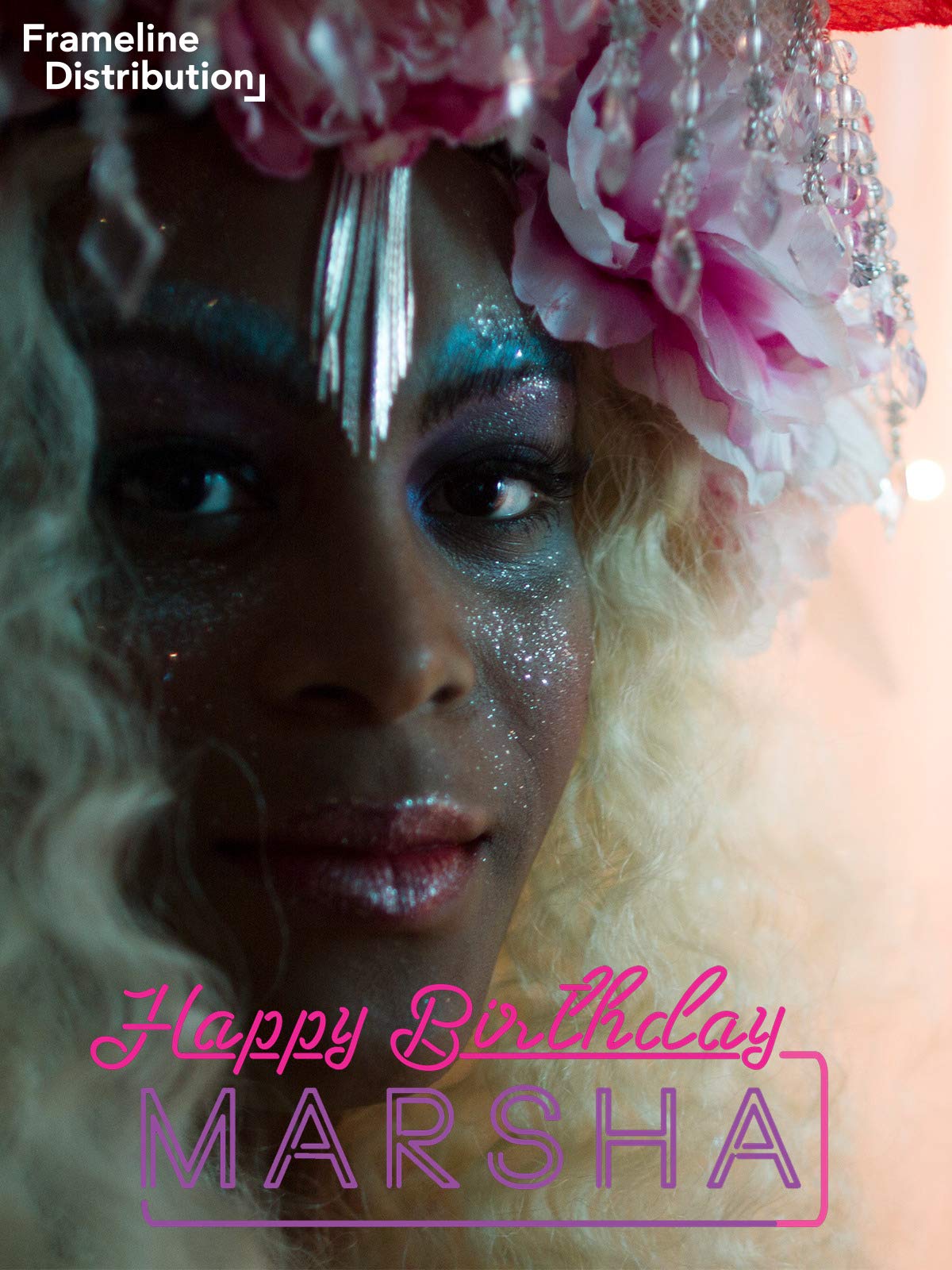This week, we will be comparing two films that examine the life and legacy of Marsha P. Johnson, The Death and Life of Marsha P. Johnson, and Happy Birthday, Marsha!
The Death and Life of Marsha P. Johnson (2017)

| |
| Directed by | David France |
|---|---|
| Running time | 1h 45m |
| Core concepts this week |
documentary ethics theory in the flesh narrative authority nonperformative glamour transgender infrastructure |
| View on Netflix | |
Film background and summary
The Death and Life of Marsha P. Johnson is a 2017 documentary, directed by David France, who is a white gay cisgender male filmmaker and journalist. It is France’s second documentary; he also directed How To Survive a Plague (2012), which focuses on HIV/AIDS and the ACT UP movement in New York City in the 1980s and 1990s. The Death and Life of Marsha P. Johnson chronicles the story of Marsha P. Johnson, a Black trans woman who was a prominent figure in the Stonewall rebellion, co-founded the group Street Transvestite Action Revolutionaries in the 1970s with Sylvia Rivera, and was an LGBTQ advocate until her death in 1992. The film follows Victoria Cruz, an anti-violence advocate, as she investigates the circumstances of Johnson’s death.
Content warnings
The Death and Life of Marsha P. Johnson contains brief nudity and discussions of violence, murder, sex work, and suicide.
Happy Birthday, Marsha! (2018)

| |
| Directed by | Tourmaline and Sasha Wortzel |
|---|---|
| Running time | 15 m |
| Core concepts this week |
documentary ethics theory in the flesh narrative authority nonperformative glamour transgender infrastructure |
| View on Amazon Prime | |
Film background and summary
Happy Birthday, Marsha is a 2018 short film created by Black trans artist Tourmaline and Sasha Wortzel. It features Mya Taylor as Marsha P. Johnson and Eve Lindley as Sylvia Rivera, and imagines the day and evening before the Stonewall riots began from Marsha P. Johnson’s perspective.
Content warnings
Happy Birthday, Marsha contains police brutality.
Notes
- This week, we will be watching these two films together to address the ethics of storytelling and the different approaches of these two films to portraying Marsha P. Johnson. Students should watch The Death and Life of Marsha P. Johnson prior to Day 1’s class, and Happy Birthday, Marsha! prior to day 2’s class along with the assigned reading for that day. For more on the controversy in the making of these two films, you may want to read (and perhaps assign) this essay by Tourmaline in Teen Vogue or this article in Slate.
- Because there are two films this week, I have reserved 15 minutes in Day 3’s class for a student-led scene analysis of Happy Birthday, Marsha! (in addition to the typical time reserved on Day 1). You could alternatively use this time for more teacher-led scene analysis or to examine the Slate or Teen Vogue articles mentioned above.
- There is a short reading for students to complete prior to Day 1 of United in Anger that I included in that week’s plans. If you want students to complete that reading in addition to the film screening, you may want to note that this week.
Materials for this week
- Lesson plans [Word doc]
- Screening quiz [Word doc]
- Secondary texts:
- Day 2: Calafell, Maria Bernadette. “Narrative Authority, Theory in the Flesh, and the Fight over The Death and Life of Marsha P. Johnson.” QED: A Journal in GLBTQ Worldmaking Vol. 6, no. 2, 2019, pp. 26-39.[pdf]
- Day 3: Tang, Jeannine. “Contemporary Art and Critical Transgender Infrastructures.” Trap Door: Trans Cultural Production and the Politics of Visibility, edited by Tourmaline, Eric A. Stanley, and Johanna Burton, Cambridge, MIT Press, 2017, pp. 363-393. (Excerpt provided: pp. 378-383) [pdf]